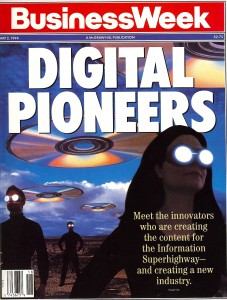Welcome to the long-overdue revamp of this blog’s design.
Our new look is courtesy of the Genesis theme framework from StudioPress, which makes things like choosing a column layout really simple. I just fiddled a bit with some of the colors and fonts and style-sheet stuff.
WordPress has become so much more powerful and elegant as a content management system over time — the widget framework for dropping in features like the Twitter box, the navigation boxes and my little book promotions is awfully straightforward. Thanks to all the developers who have brought us to this fine place!
I’ve tested things out on various browser/platform combos but let me know if you see anything funky.


 This sweatshop approach to content creation is, of course, anathema to old-fashioned writers and editors. It raises all sorts of disturbing questions about the advertising cart leading the editorial horse (as
This sweatshop approach to content creation is, of course, anathema to old-fashioned writers and editors. It raises all sorts of disturbing questions about the advertising cart leading the editorial horse (as